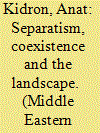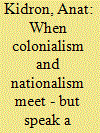| Srl | Item |
| 1 |
ID:
192266


|
|
|
|
|
| Summary/Abstract |
Higher education is a key component of human capital and is positively linked to improving the economic, social, and personal aspects of life. This study aims to examine how people living under circumstances of dramatic sociopolitical change perceive the opportunity to pursue higher education and the social and personal meaning they attach to it. The Druze community on the Golan Heights serves as a case study. This community has undergone dramatic changes since the outbreak of the Syrian civil war, reflected among other things by enhanced interactions with Jewish and Israeli society. The results of semi-structured interviews with young adults in the community who studied at Israeli higher education institutions indicate that interviewees perceive their studies as increasing their sense of security. While some interviewees described rational considerations in choosing where and what to study, others made choices that in the short term might lead to economic losses. Nevertheless, their rationalization of these choices based upon preserving the local social fabric can contribute to their sense of security in the long run. Their perceptions regarding increasing integration into Israeli society are mixed and reveal a pragmatic approach.
|
|
|
|
|
|
|
|
|
|
|
|
|
|
|
|
| 2 |
ID:
146771


|
|
|
|
|
| Summary/Abstract |
Haifa was named a ‘mixed city’ by the British, who ruled Palestine from 1917 to 1948, in reference to the two national communities that inhabited the town. This definition was not neutral, and reflected the Brits aspirations to create national coexistence in Palestine among the diverse urban societies.
|
|
|
|
|
|
|
|
|
|
|
|
|
|
|
|
| 3 |
ID:
187003


|
|
|
|
|
| Summary/Abstract |
This paper addresses the convergence of British colonialism and Zionist aspirations in Mandatory Palestine. As research so far explored this topic mainly as a confluence of colonial-national interests, this paper is an attempt to look at it from another vantage point, based on the different interpretations of European Modernism and Orientalism by these two groups. The new variable is the Zionist perception of nationalism, and its ties to European Modernism, which strengthened Zionist autonomy in a way that countered British interests to some extent and strengthened Zionist advantages in Palestine over Arab society. These processes were particularly prominent in mixed cities. Haifa was central to this concept as it was free of historical or symbolic baggage. The British developed Haifa as a strategic economic centre, and as a modern space. Promoting unilateral national interests was the very opposite of the British intention for the city. Yet, they allowed and even encouraged Zionist entrepreneurs to create an autonomous national community. We contend that the British had a certain blindness to the symbolic significance that the Zionists attached to the process of urban development, not only as a Modern-European development process but as a basis for national autonomy.
|
|
|
|
|
|
|
|
|
|
|
|
|
|
|
|
| 4 |
ID:
164916


|
|
|
|
|
| Summary/Abstract |
The article focuses on the political establishment's attitude toward Israeli youth during the early years of statehood, viewing it from a new angle: regarding young people as a political force reflecting the effects of contemporary social development. I focus on those described as hegemonic youth, members of Israel's social and economic elites. This approach sees the attitude of the political establishment toward the youth as a political expression and suggests an instrumental approach toward youth and the youth ethos in Israeli society as a tool to construct republicanism. Hence, despite publicly having declared the need to strengthen the Zionist youth movements and young national activism, the state's financial and organizational efforts were mainly invested in generating alternatives to the pioneering youth movements, along with the effort to change their ideological and organizational base. These alternatives included ‘good citizenship’ education in schools and informal settings, which were disconnected from the Labor Movement's values and were suited to urban adolescents; the attempts to narrow the dominant position of the parties and the settler movements in pioneering missions, favoring state mechanisms instead; an increase in the state's investments in supplementary education; and the establishment of settings for youth and student clubs.
|
|
|
|
|
|
|
|
|
|
|
|
|
|
|
|